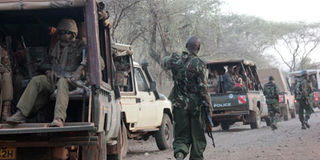Suspicion over police involvement in banditry takes shape

Police officers escort residents out of Mukutani centre in Baringo County on March 15, 2017. The county is a hot spot for bandit attacks that have led to many deaths. PHOTO | CHEBOITE KIGEN | NATION MEDIA GROUP
What you need to know:
- The well-planned attacks on security officers has sparked fears that some former officers were behind the planning.
- Security experts are now calling for the profiling of former police and military personnel in the cattle rustling hot spots.
With its rugged terrain and unbearably high temperatures, the banditry-prone Kerio Valley, which runs across Baringo and Elgeyo-Marakwet counties, is one of the most dangerous places to work in for a police officer.
The unfriendly terrain has played to the advantage of armed bandits, who lay ambush on security officers posted to beef up security with most of them unfamiliar with the region.
A spot check by the Nation during a tour of the area that has come to be known as “The Valley of Death” last week revealed that the area has deep gullies occasioned by many years of soil erosion, making it a perfect hideout for the daring bandits.
Perhaps the worst of the region’s attacks is the killing of 19 Administration Police (AP) officers in the porous Kapedo, on the boundary of Baringo and Turkana, in 2014.
The officers were on a mission to recover a vehicle that had been set ablaze in another botched security operation.
AP Constable Eric Mugendi, who survived the ambush, attributed his escape to the Divine.
“I have been an AP officer for three years but I have never encountered such a bloody experience,” APC Mugendi told the Nation. “I don’t know how I survived the bullets that rained on our lorry.”
READ: Ruto defends military deployment in Kapedo
Mr Mugendi, who sustained a fractured leg and hand in the shootout, said the bandits were heavily armed.
He recalled: “Our lorry was moving slowly when it was sprayed with bullets. We jumped out for cover as they surrounded the vehicle and rained bullets on it, killing most of our colleagues.”
OFFICER KILLED
The scene was littered with spent bullet cartridges and the vehicle, which was partly burnt by the bandits, riddled with bullet holes.
Inside the shell that used to be the police Land Rover were dozens of used bullets, a clear indication that the officers died a painful death.
The well-planned attacks on security officers has sparked fears that some former officers were behind the planning.
Last year, a former General Service Unit (GSU) constable in Baringo, Mr Lucas Majong Todong, who was believed to be behind the Kapedo attack, was shot dead by police after he attempted to escape.
The ex-policeman is said to have organised the attack in which three officers, escorting examination papers to Kapedo Mixed Secondary School, and two teachers were killed. They also burnt the police Land Cruiser.
Detectives said they had sufficient evidence to link the deceased to the attacks but wanted to carry out further investigations in Kabarnet.
He had been questioned and his statement taken at Nginyang’.
However, on reaching Chesirimon centre, about eight kilometres from the police station, he grabbed a firearm belonging to one of the officers escorting him and attempted to escape.
He was pronounced dead on arrival at Kabarnet Referral Hospital.
Security experts are now calling for the profiling of former police and military personnel in the cattle rustling hot spots of Baringo, Turkana, Laikipia and Samburu over fears that some of them may be behind the deadly attacks on civilians and security officers.
“It seems these attacks are planned by well-trained fellows,” Colonel (Rtd) Moses Kwonyike observed.
“For instance, even if the slain Kapedo officers had tried to escape they would not have managed.
“Fire and manoeuvre, where those executing an attack are covered, is only done by the highly trained soldiers. Those are war tactics, which you cannot get from ordinary raiders.”
PROBE SECURITY OFFICERS
Mr Kwonyike, who also served as a military advisor, head of United Nations (UN) African Mission in Darfur, Sudan, said the activities of former police officers and soldiers and also provincial administrators, especially chiefs, should be investigated.
“Ordinarily, these are civil servants who should be assisting the government to identify where livestock, which pass though their locations after raids, are,” Mr Kwonyike and posed: “They very well know where those behind the raids are; why haven’t they volunteered the information to the government?”
Baringo County Commissioner Peter Okwanyo said investigations had been launched to establish if some senior government officers, security personnel and other prominent individuals were behind the banditry.
“Those found culpable, irrespective of their status or position in society, will face the full force of the law. We will not tolerate any form of lawlessness," Mr Okwanyo told the Nation.
The administrator warned chiefs in Tiaty Sub-County, where the armed bandits are suspected to originate, to identify the culprits or risk being sacked.




